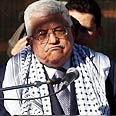
Abbas. Must be rescued
צילום: AFP
The mission: Saving Abbas
Israel realizes PA’s survival crucial for preserving regional stability for now
Mahmoud Abbas must be saved.
The construction freeze in the settlements is yet another oxygen tank en route to reviving the “diplomatic horizon,” without which we shall see the Palestinian Authority increasingly disintegrating.
This is not about getting sentimental with Abbas or a sudden love story between the Israeli government and the diplomatic process. Even the tough “ideologists” within the cabinet realized Wednesday that there is no other choice, and that every effort must be made in order to preserve regional stability, even for a limited time. The Palestinian Authority must not collapse.
Abbas has turned into a key player; the stability of his regime maintains the calm and stability everyone needs until matters clear up on the Iranian front. Even those who object to making concessions to the Palestinians realize that we have to buy time. And buying time means maintaining the diplomatic process vis-à-vis the PA.
Hence, when officials around here debate the Gilad Shalit question, they simultaneously discuss the question of how to minimize the damage to be caused to Abbas and the PA in the wake of the mass release of prominent Hamas terrorists.
Even before the Shalit deal, Israeli officials estimated that the PA will not survive without a diplomatic horizon. Abbas would eventually give up and quit, and this will mark the beginning of disintegration that may lead to anarchy and to a third Intifada, which Fatah heads are already characterizing as a “popular struggle.”
A popular struggle, for the benefit of those who may have forgotten, may indeed start with stone-throwing, but will end with fire. And who needs fire on the eve of fateful decisions on Iran.
Government faces a test
Defense Minister Ehud Barak was the one who came up with the idea of a partial settlement freeze for a limited time, in the framework of the preparations for his and the prime minister’s trip to the United States a few weeks ago. The Americans were not excited by the idea, because this is not a full freeze, yet they were convinced after realizing this is the most an Israeli PM can do at this time.
However, President Obama made it clear to the Israelis in Washington that he is willing to try this move in order to promote the revival of talks, but expects much more later on.
Now, we are waiting for Abbas. He will come, if at all, only if Israel shows a serious attitude in implementing the freeze decision and doesn’t make a mockery out of it. Showing a serious attitude means enforcing the government’s decision. The defense minister was scheduled to meet Thursday with law enforcement officials in the territories – the police, army, and military prosecutors – in order to formulate a realistic plan for enforcing the freeze.
This, in and of itself, is a historic moment. Based on the cabinet’s decision, funds have been earmarked for increasing the number of Civil Administration inspectors and police forces who are supposed to enforce construction regulations in the territories.
Once every few days, a private company will provide aerial photographs of the West Bank. Every few days, the inspectors will show up at illegal construction sites and use their authority to raze the structures. During security establishment discussions, officials prepared for the possibility that the settlers will try to “test” the government’s seriousness, and that some violent groups may try to sabotage enforcement activities.
So now the government is facing a test: Do we have law and order? And what is the national interest, the settlers or the government?










